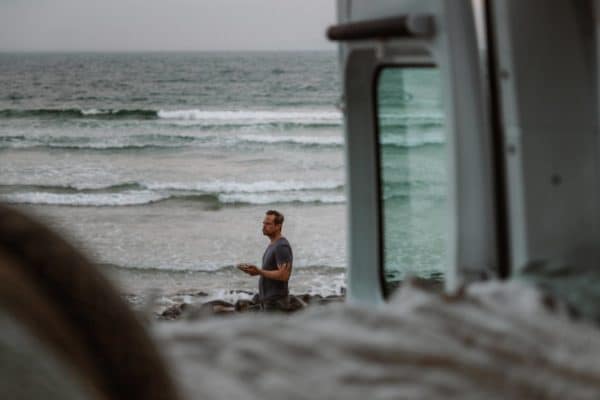Meet Melinda Tually, The Inspiring Coordinator For Fashion Revolution Australia / New Zealand
Olivia Burton
Fashion Revolution Week is coming up on the 23-29th April, with this year being its five year anniversary.
For those that have been living under a rock for the last five years, Fashion Revolution is the largest fashion movement globally, which was initially sparked from the Rana Plaza factory collapse in Bangladesh in 2013, killing 1,138 garment workers.
The non-profit movement aims to inspire people and organisations to collaborate, ultimately towards greater transparency, sustainability and ethics in the fashion industry.
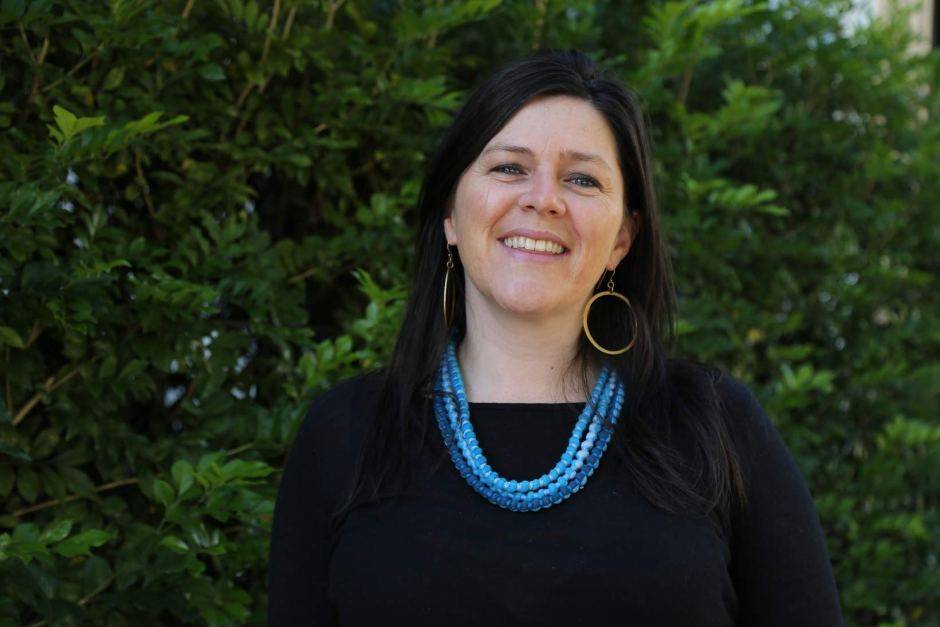
"It’s healthy to have honest conversations about what’s working, what isn’t, what’s having impact and what isn’t and I’m glad to see that’s happening here now."
Fashion Revolution has created a unique and powerful voice of change-makers, striving to take action and use fashion as a force for good.
Each country has it’s own coordinator, working hard to grow the movement. With 2.5 million people taking part in Fashion Revolution just last year, clearly the coordinators have done an extraordinary job.
What many people may not realise is that these coordinators are unpaid volunteers, who dedicate their time and hard work to change the fashion industry for good.
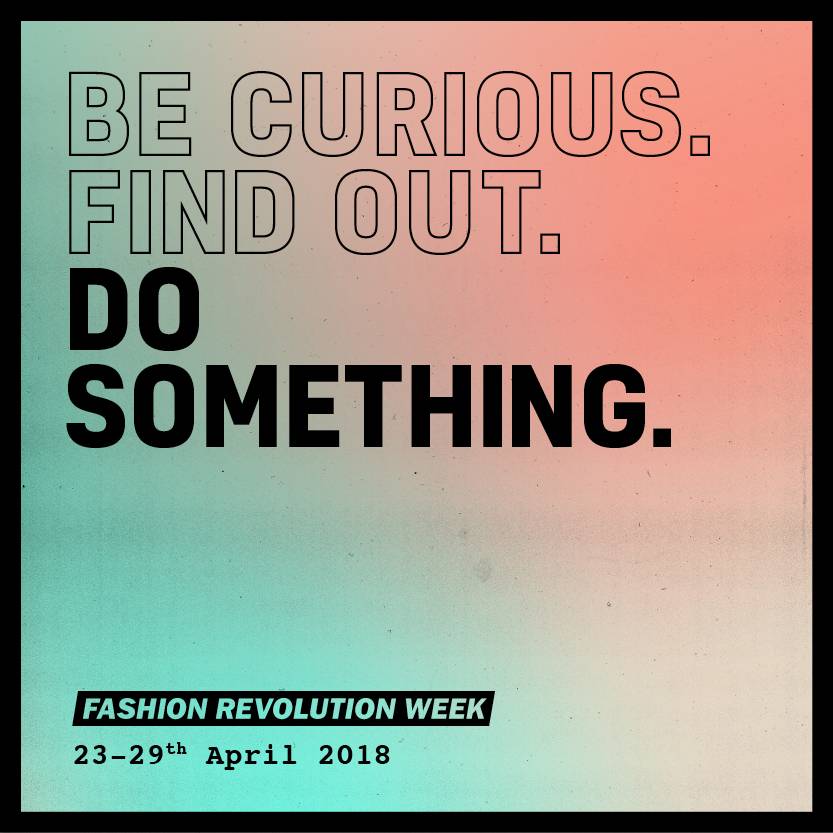
Melinda Tually is one of these coordinators, having been the Fashion Revolution Coordinator for Australia and New Zealand since it’s inception in 2013.
She met the founders Carry Somers and Orsola de Castro at a conference overseas a few months after the Rana Plaza collapse and has since created a dedicated following back here in Australia. Mel is an extra special individual who has the drive, wit and skills to do pretty much anything. She works all hours to get sh*t done and just Googling her name brings up some pretty impressive credentials.
I gave Mel a call to ask her a few questions about working on Fashion Revolution for the last five years and what keeps her going.
“I’ve never worked traditionally in the fashion industry”
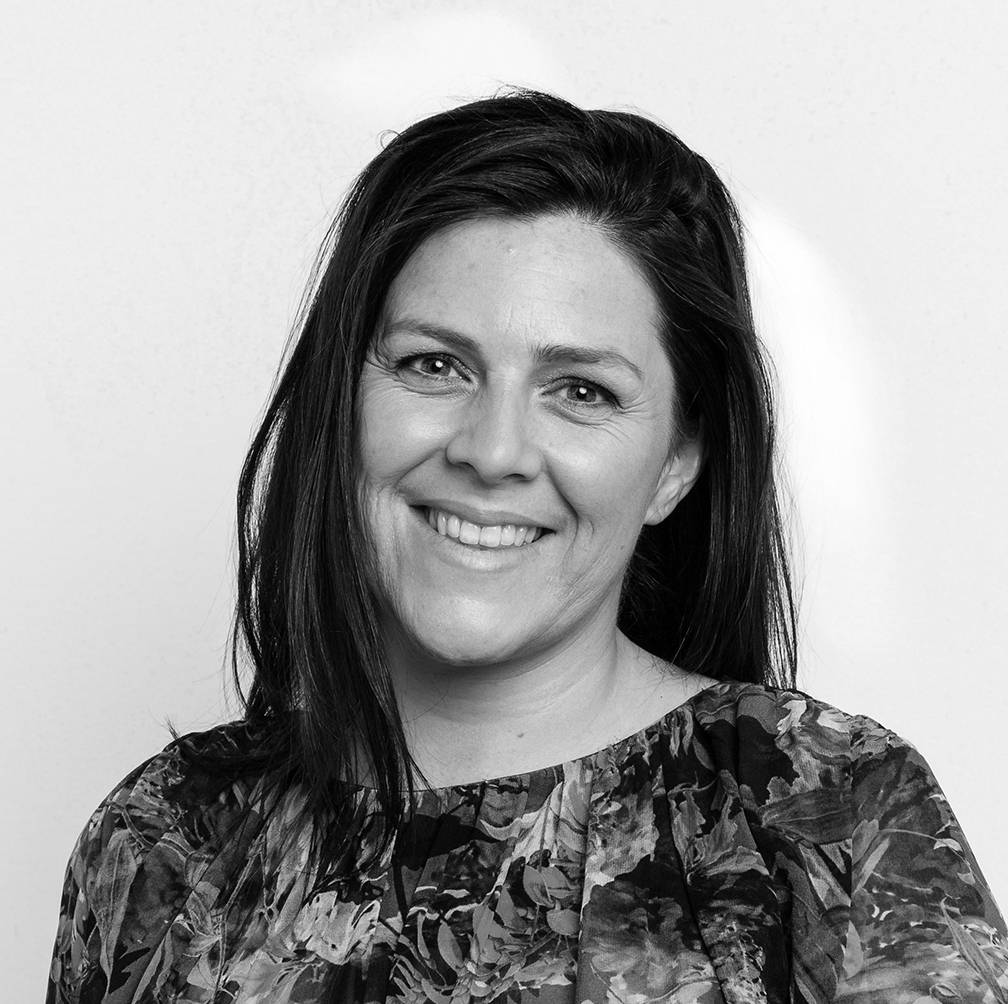
Mel’s background is fascinating; she has an unconventional background ranging from investment banking to working on Hollywood films.
For the last ten years, she has worked within the ethical business space, at one point owning her own fair trade and sustainable homewares and gift shop in Surry Hills, Sydney. Aside from Fashion Revolution, Mel now focuses her time on her business, an ethical sourcing consultancy working with some of the biggest brands in the country. It was whilst she had her shop that she started to gain an interest in sustainable fashion.
I ‘d be in the store researching brands, and I started to realise the change that was happening in the fashion space. I could see the desire from brands, consumers and stakeholders to address the issues in that sector. I’d never worked in fashion, but was driven by the pace of change and potential that I could see.
Once I came back from meeting Carry and Orsola (Fashion Revolution Founders) overseas, I was even more confident in the decision I’d made to start consulting to brands on making change so that was the beginning of Ndless (an ethical supply chain consultancy). I don’t think my compass will ever change from wanting to help make the world a better place in someway. It’s an integral part of my life.
Mel has quite a rare view of the fashion industry and Fashion Revolution, having seen the community expand and evolve over five years. She’s been in it from before the first campaign in 2014, even kicking off the main Instagram account @fash_rev (which now has over 124K followers).
https://www.instagram.com/p/BhtYX-0ggwx/?taken-by=fash_rev
“It was spine tingling watching all the people taking part”
It doesn’t feel like five years. It’s exciting, overwhelming and satisfying to think of everything we’ve achieved. I remember really clearly the day we kicked off the first campaign. As Australia and New Zealand are the first time zones to start it off, it was spine tingling watching all the people taking part. We honestly didn’t know how many people would get involved or if it would reach anyone, we were bowled over by the amount of people that jumped on board.
Looking back, there are so many highlights to reflect on. In 2015, we held a sold out launch screening of the documentary True Cost at the Dendy in Circular Quay with a brand panel afterwards. A lot of the coordinators worldwide held True Cost screenings, which had a tremendous effect. This event in Australia was one of the first public events where brands starting having these types of open conversations about the industry.
It was fun interviewing my teen crush Kelly Slater (American 11 time World Surf Champion) about his label Outerknown and to have he and John Moore’s support. I’d also say co-hosting the first industry event in 2015 which brought together the largest brands in the country to discuss supply chain issues in the fashion sector was a big achievement. I’m so keen to influence industry change so that was a real watershed moment.
“There is no good or bad brand…”
I asked Mel a few questions around brands, knowing that she has interesting experience and insights from a range of different sides and countries. Just like Fashion Revolution, Mel is a big believer in brands being transparent and honest, admitting faults and moving forward. Fashion Revolution doesn’t believe in boycotting or lobbying companies and it’s one of the reasons I personally like them. They use accessible and non-aggressive tactics to get brands involved in the conversation.
In the last five years, brands are starting to collaborate and have direct lines of communication to talk about the bigger picture issues. Every business that produces something has an impact and brands need to take ownership and responsibility for that. In saying that, we can’t expect brands to be perfect or to fix things overnight. It’s not practical. There is also no good or bad brand. It’s just not that simple and it’s not constructive to paint it like that. There needs to be a level of honesty amongst brands where they can talk realistically, not under a veil of ‘we are doing all these initiatives and nothings going wrong’. It’s healthy to have honest conversations about what’s working, what isn’t, what’s having impact and what isn’t and I’m glad to see that’s happening here now.
It’s going to take time to reinvent a traditionally opaque industry, working away issue by issue. At the end of the day, it’s people that are creating this change and we have to recognise that it’s down to human capacity, that, and the direction of the brand’s strategy. Some business leaders just have more of an appetite to act. Those that do are under the spotlight even more.
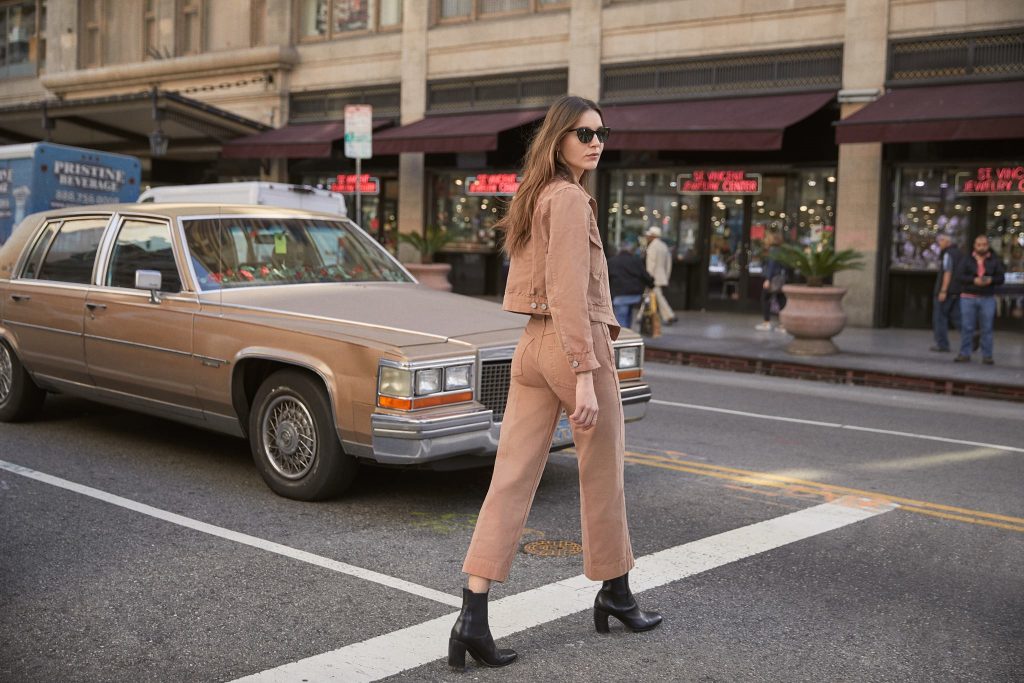
Image: Reformation
“When you stick your head out to do something different, it’s not easy”
When I asked Mel to list some brands that are doing exciting things in their businesses, she had too many to even say. The below are some off the top of her head.
Reformation – making sustainability sexy
Patagonia – everyone’s favourite outdoor brand, they are always working on new exciting things and pioneering supply chain transparency and traceability
Stella McCartney – I celebrate her using her voice, not everyone wants to be an advocate. Her values are intrinsic to her life regardless of whether she’s a designer but she’s chosen to discuss the issues and has really stepped up her advocacy in this space. It’s really helpful to have people in the luxury sector who command attention and have the influence to mobilise change. It’s hard to be an outlier in your circle so I applaud her for staying true to her values . I’m excited about bio synthetics and loved seeing her dress with Bolt Threads in New York last year at MOMA. This kind of innovation is so exciting and cutting edge.
Outerknown – they are constantly working on their supply chain and started from scratch to be a responsible brand. They published their suppliers within the first year or so of production, advocate for marine health, use Fair Trade USA certified CMT factories. For a small brand they are addressing the whole remit in a really considered fashion. This kind of ‘slow fashion’ is where it’s at. Womenswear is now on the way!
"The volume of what we are producing is alarming and the level of waste is getting out of control. Where can it go?"
“Some of the biggest issues in the fashion industry are wages, water and waste”
Fashion Revolution still has lots of work to do as the fashion industry has a magnitude of ethical and environmental issues. I was curious to find out what Mel thought were three of the most dominating existing issues in the fashion industry and without hesitation she answered – wages, water and waste.
We’re still talking about living wages, as there is not one easy solution. It’s very complex and we need to be working with the right people all the way down the supply chain – factory workers, governments, unions and brands to achieve them. I’m very hopeful the ACT initiative can establish a pathway for living wages not yet attempted before. Like the Bangladesh Fire and Safety Accord, it’s taking a multi stakeholder approach so it will take time to have an effect and prove whether it works but the Accord broke new ground with regards to safety so I’m gunning for this to do the same with wages.
We need to reduce water usage in the production and growing phases of resources e.g. with cotton. It’s a critical issue as is the treatment and pollution of water. There’s a lot of work being done in that space by governments, industry and brands alike but whether it’s happening fast enough or to the scale needed I’m not so sure. Water is our life source and the life source of the communities around where our clothes are made so it’s of such urgency that it needs to be at the top of the agenda for the whole industry.
The volume of what we are producing is alarming and the level of waste is getting out of control. Where can it go? China’s recent mandate to stop taking waste from the west is forcing Australia and many other countries around the world to face the issue that ‘there is no away’. Now we have to find waste solutions in our own backyard. Obviously the circular economy is a huge part of that and should have been part of systems thinking in the garment sector at an industrial level long before now. It’s the hot topic now which is great for unpacking the linear model we’ve had and redesigning the future but it’s only at it’s very beginning. We can’t wait for circularity to truly kick in, for the pilot projects to eventuate and the infrastructure to be built to then come up with scalable waste solutions. We have to address the volume issue now.
Image: unsplash
“Every year with progress I’m driven to see what else we can achieve”
The question that I always wanted to ask people that work on shaping social enterprises is, what drives them. Knowing that Mel sends emails at 2am sometimes, I want to know what has kept her going for the last five years as a change-maker.
It’s some strange bottomless pit of passion to create a better world that keeps me going I suppose. I’m strongly driven by a desire for change. I find it hard to do less than 150% when I commit to something though so it can be a tad unhealthy I’ll admit. I’ve pushed myself at times due to a sense of responsibility but in the last 12 months, I’ve realised that self-sustainability is just as important as sustainable fashion! I don’t need to be a superhero. I’m as committed as ever but it’s ok to not achieve everything I planned to. It’s a long road. I’m proud of what I’ve built. What we’ve achieved in Australia without any financial backing or paid staff is huge so this year being our fifth I’ll definitely be taking time out to celebrate the changes we’ve seen since we begun.
“There are more corners of the world to uncover, more consumers to educate and more brands to reach”
In the next five years, I’d like Fashion Revolution to become sustainable and move beyond a volunteer model. Interest and demand is growing year on year so we are globally relevant and now we need to establish a way to sustain ourselves. I’d like us to continue working with the industry side by side as we have been. There are still tonnes of brands in the ‘middle layer’ that need to be focused on; big brands are always in the spotlight but it’s the brands that don’t have such big names, or often no consumer facing name as they produce private label product that need to be engaged. Every business should have an ethical sourcing strategy and visibility of their supply chain. It’s critical.
Well, we are lucky to have Melinda Tually driving the Fashion Revolution ship for Australia / New Zealand and I’m excited to see what the next five years brings.
Check out how to get involved with Fashion Revolution Week here.
Main image: ABC


